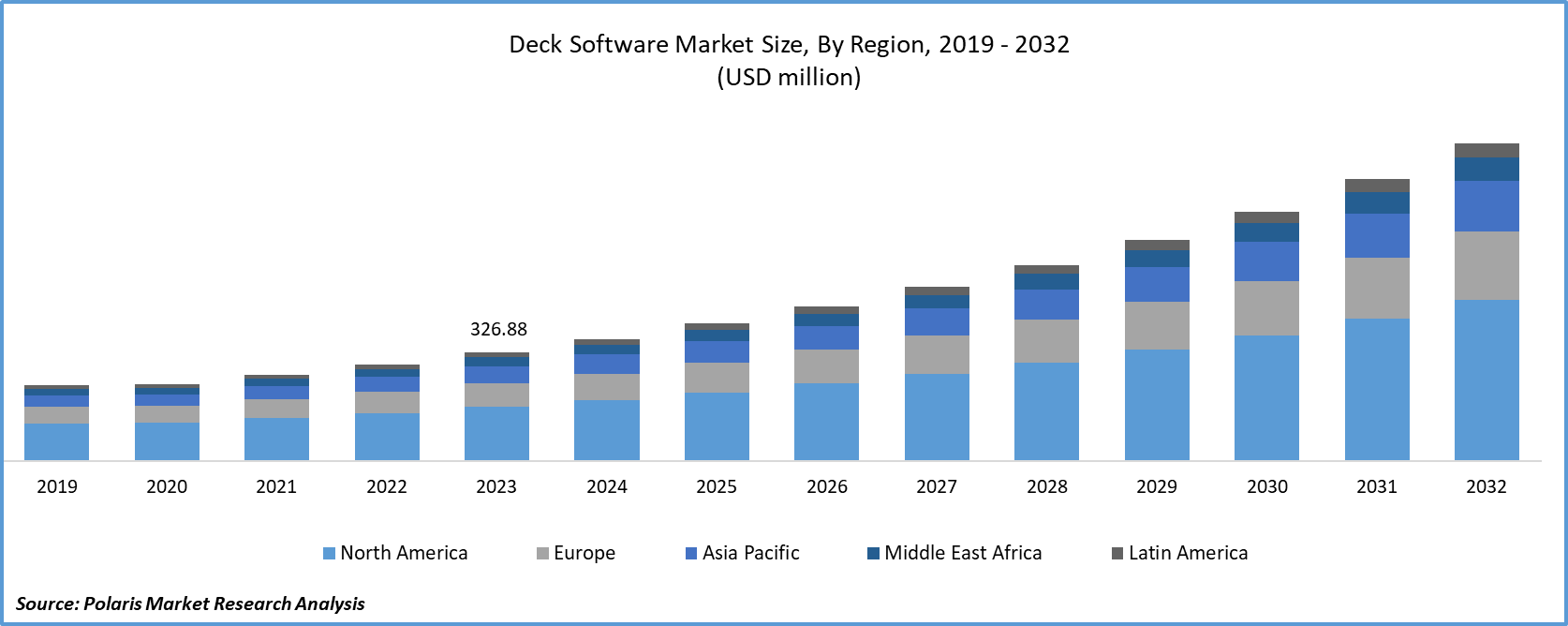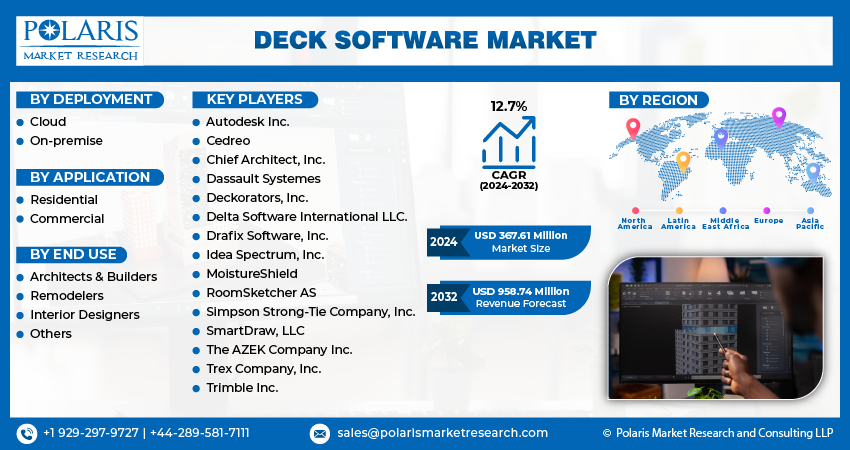
Deck Software Market Share, Size, Trends, Industry Analysis Report, By Deployment (Cloud, On-premise), By Application (Residential, Commercial), By End-use (Architects & Builders, Remodelers), By Region, And Segment Forecasts, 2024 - 2032
- Published Date:Dec-2023
- Pages: 118
- Format: PDF
- Report ID: PM4140
- Base Year: 2023
- Historical Data: 2019-2022
Report Outlook
The global deck software market was valued at USD 326.88 million in 2023 and is expected to grow at a CAGR of 12.7% during the forecast period.
The market for deck software solutions is experiencing increased demand, driven by the need for streamlined and efficient deck design processes. Furthermore, the architectural industry's integration of advanced technologies like artificial intelligence, virtual reality, and cloud computing is a significant factor fueling the market's growth. The industry is recognizing the importance of collaborative and integrated platforms that enhance communication and coordination among various professionals, including architects, engineers, and other stakeholders in the architecture and construction sectors.

To Understand More About this Research: Request a Free Sample Report
The rising demand for deck design software stems from the need for a simpler way to create deck structures to generate detailed design reports, floor plans, and material lists. These software solutions provide significant time and cost-saving advantages compared to the traditional method of hand drafting, fueling their popularity. The adoption of deck design software is also influenced by residential landscaping initiatives, optimizing backyard and gardening spaces at efficient costs. Additionally, the trend among home-owners to create intricate decks is expected to further boost the demand.
Deck design software simplifies the process of creating, saving, and printing plans for designers. These software options offer customizable features to align with users' preferences. While numerous digital design packages are accessible, planners and designers are increasingly seeking specialized deck design software that goes beyond standard graphic design tools. Dedicated deck design software enables project planners to swiftly create and modify their designs, allowing them to add, delete, edit, or upgrade elements as needed.

For Specific Research Requirements, Request for a Customized Research Report
Growth Drivers
Digital Transformation
In response to the increasing complexity of real estate projects, industry stakeholders are engaging multiple experts with specialized skills. Real estate companies are incorporating various building software solutions, including 3D modeling tools, designing tools, & computer-aided tools, to simplify their operations and enhance efficiency. These software offers diverse material options, user-friendly interfaces, and integrated structural choices, making it a more seamless solution compared to standalone deck software. Additionally, precise 3D measurements empower planners to provide installers with comprehensive details, ensuring the design aligns perfectly with the client's specifications.
Deck software empowers users to customize every aspect of their new deck, allowing them to explore various colors and materials within the application. The software automatically generates a materials list, estimates pricing, and provides a printable visual representation for users to share with potential contractors once they are content with their design. Utilizing Augmented Reality (AR) or Virtual Reality (VR) technologies, the deck program is compatible with most web browsers, guiding users seamlessly through the deck design process. Consequently, the integration of AR/VR applications in deck software is anticipated to fuel deck software market growth.
Report Segmentation
The market is primarily segmented based on deployment, application, end use, and region.
|
By Deployment |
By Application |
By End Use |
By Region |
|
|
|
|
To Understand the Scope of this Report: Speak to Analyst
By Deployment Analysis
- Cloud segment garnered the largest share
Cloud segment dominated the market. It offers automatic updates, remote access, cost savings, & on-demand support. This eliminates the necessity for users to buy, manage, and maintain software and hardware on their premises, as SaaS providers deliver a bundled package of data storage, software, and support on a subscription basis. These SaaS solutions are typically hosted on the provider's servers in the cloud environment and can be accessed by users via internet connectivity.
On-premise segment will grow at significant pace. The demand for on-premise deck software is rising due to organizations' heightened focus on compliance and data security. On-premise software is installed and operates on the customer's own hardware infrastructure, hosted locally. The increasing need for specific features, customization options, and robust data security is prompting customers to seek software solutions that offer higher flexibility, enhanced security, and ease of operation.
By Application Analysis
- Residential segment accounted for the largest market share in 2022
Residential segment accounted for the largest market share. Deck software solutions are experiencing a surge in demand from residential project developers, contractors, and interior designers. With homeowners increasingly seeking specific details in terms of color, materials, and designs, it has become essential for designers to create blueprints that precisely match these requirements. Deck software offers advanced features including 2D and 3D representations of layouts, sizes, shapes, and intricate details, all crucial for the final development of the deck.
Commercial segment will exhibit robust growth rate. It plays a crucial role for commercial project developers by allowing them to visually represent layouts, sizes, floor area, safety features, and security tools in formats like presentations or movies. It offers a range of features including 2D and 3D representations, inspirational deck templates, and customization tools for designing components like staircases, railings, claddings, fasteners, and other accessories. As a result, deck software enables the creation of well-structured, detailed, and realistic project outlines, essential for the development of commercial deck projects.
By End Use Analysis
- Architects & builders segment accounted for the largest market share in 2022
Architects & builders segment accounted for the largest market share. Architects play a pivotal role in the industry due to evolving customer needs and the increasing intricacy of construction projects. They are responsible for tasks such as aligning deck materials with the design, creating blueprints to meet sustainability and compliance standards, and integrating diverse client specifications into the deck plans.
Remodelers segment will exhibit robust growth rate. Remodelers are increasingly turning to deck software due to the necessity of altering structural designs, specifications, and optimizing existing space usage. This software aids remodelers in effectively utilizing available space, selecting appropriate materials, and integrating homeowners' specific requirements into the deck plans. It enables remodelers to draw and import deck layouts from a gallery, customize sizes, shapes, and dimensions, and recreate existing backyard and outdoor spaces.
Regional Insights
- North America accounted for the largest share of global market in 2022
North America garnered the largest share. This growth can be credited to the rapid advancement of residential and commercial projects in the region. Increasing preferences for activities like house gatherings, outdoor barbeques, pool parties, and outdoor events are driving the demand for deck development and installation in both residential and commercial properties, contributing significantly to the region’s growth.
APAC will grow at the substantial pace. This growth is attributed to the region's dynamic evolution in the construction industry, leading to the development of numerous new residential & commercial projects. These projects often involve the creation of outdoor living spaces like decks, balconies, & rooftops. Essential elements such as railings, walls, staircases, & floorings demand meticulous detailing and specific specifications tailored to meet the unique requirements of clients.
Key Market Players & Competitive Insights
Leading companies in the industry uphold comprehensive product portfolios to sustain their competitive advantage. They focus on product offerings, the segments they cater to, the advanced technology they employ, strategies for product differentiation, and their overall influence on the industry.
Some of the major players operating in the global market include:
- Autodesk Inc.
- Cedreo
- Chief Architect, Inc.
- Dassault Systemes
- Deckorators, Inc.
- Delta Software International LLC.
- Drafix Software, Inc.
- Idea Spectrum, Inc.
- MoistureShield
- RoomSketcher AS
- Simpson Strong-Tie Company, Inc.
- SmartDraw, LLC
- The AZEK Company Inc.
- Trex Company, Inc.
- Trimble Inc.
Recent Developments
- In May 2023, Trex Company introduced Trex Deck Design Tool & Online Deck Planner. This tool enables users to visualize and design their decks, assisting with budgeting, permit blueprints, and generating a materials shopping list.
- In October 2023, SmartDraw introduced new version of SmartDraw Software, featuring an updated user interface, more versatile flow charts, improved whiteboarding, & improved data visualization capabilities. These upgrades were designed to transform SmartDraw into a unified platform, integrating white-boarding, diagramming, and data visualization into a seamless and user-friendly solution.
Deck Software Market Report Scope
|
Report Attributes |
Details |
|
Market size value in 2024 |
USD 367.61 million |
|
Revenue forecast in 2032 |
USD 958.74 million |
|
CAGR |
12.7% from 2024 – 2032 |
|
Base year |
2023 |
|
Historical data |
2019– 2022 |
|
Forecast period |
2024 – 2032 |
|
Quantitative units |
Revenue in USD million and CAGR from 2024 to 2032 |
|
Segments covered |
By Deployment, By Application, By End Use, By Region |
|
Regional scope |
North America, Europe, Asia Pacific, Latin America, Middle East & Africa |
|
Customization |
Report customization as per your requirements with respect to countries, region and segmentation. |
FAQ's
key companies in portable dishwasher market are Autodesk, Cedreo, Chief Architect, Deckorators, Delta Software, Drafix Software
The global deck software market is expected to grow at a CAGR of 12.7% during the forecast period.
The portable dishwasher market report covering key segments are deployment, application, end use, and region.
key driving factors in portable dishwasher market are technological advancements.
The global deck software market size is expected to reach USD 958.74 million by 2032
